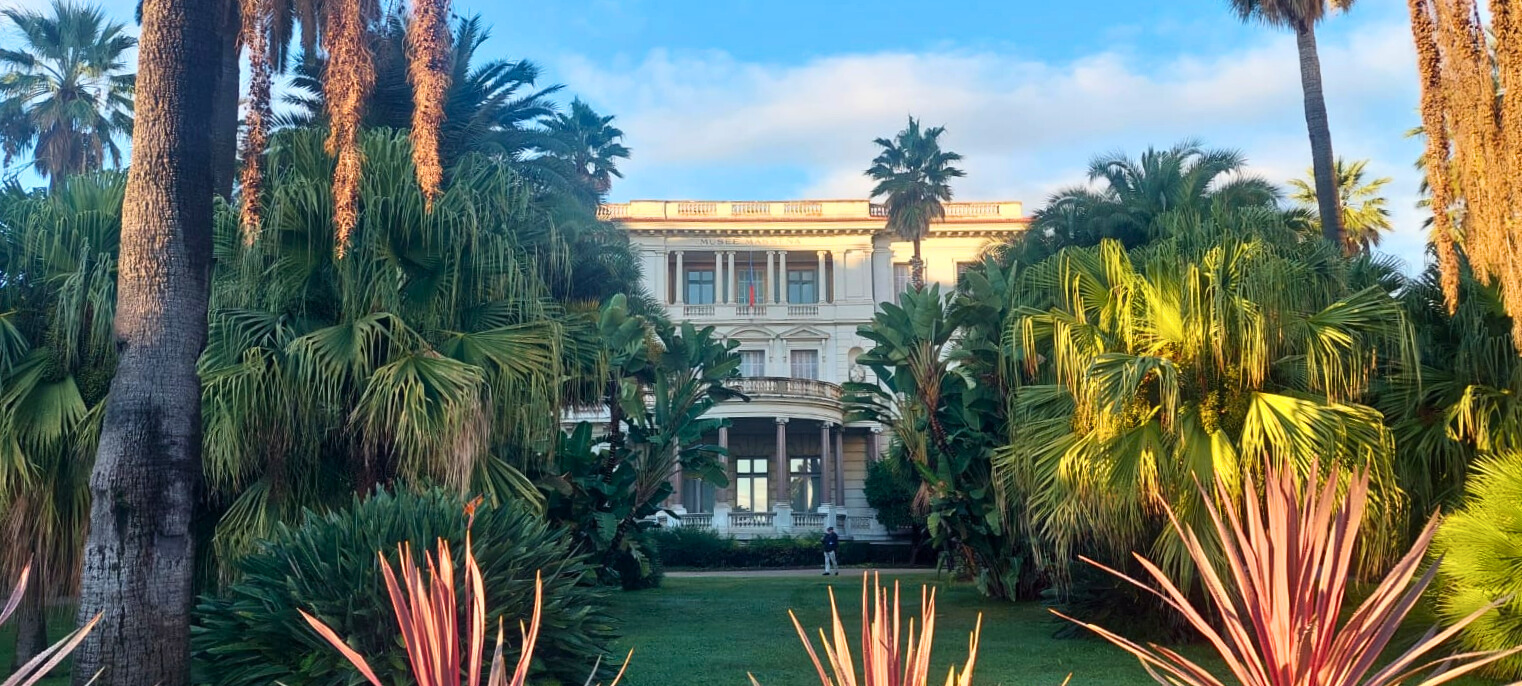When you stroll through Nice, you quickly realize that art is in the air. It reveals itself in the pastel façades of the Old Town, in the golden light along the Promenade des Anglais, and in the effortless style of people sipping their morning café au lait as if they had never done anything else.
Maybe you will feel the same way I do. You come to Nice for the mountains, or more likely for the sea, only to find that what really draws you in is a feeling, one that brings the city remarkably close. That very spirit lives on in its museums. Some are housed in grand old palaces rich with history, others in sleek modern buildings of glass and light. A few are world-famous, while others are hidden gems you might just have all to yourself.
Visiting a museum is something almost meditative for me. With music in my ears, I lose myself in paintings, in the discovery of historical details, and in that quiet sense of wonder that so often finds me in places like these.
In this article, I will take you on a tour of Nice’s museums. Whether you love art, want to dive into history, or, like me, simply crave a moment of calm, you will find it here. Promise.
The Most Important Museums in Nice at a Glance
Before we dive in, here is an overview of the most popular museums in Nice:
| Museum | Short Description |
|---|---|
| Musée Matisse | Color, form, and pure joie de vivre |
| Musée Marc Chagall | Spiritual art with deep emotion |
| MAMAC (Museum of Modern and Contemporary Art) currently closed | Pop art and avant-garde in glass and concrete |
| Musée Masséna | The history of Nice and the Belle Époque |
| Palais Lascaris | Baroque palace featuring musical instruments |
| Musée des Beaux-Arts | Classical art inside a stately villa |
| Musée Archéologique de Nice-Cimiez | Roman ruins and ancient city history |
| Musée de la Photographie Charles Nègre | Contemporary photography |
| Musée International d’Art Naïf Anatole Jakovsky | Naïve art displayed in a historic villa |
| Musée de Préhistoire de Terra Amata | Prehistory and excavations on Mont Boron |
| Muséum d’Histoire Naturelle de Nice | Natural history of the Riviera: animals, fossils, and minerals |
Contents
This article contains affiliate links. If you book something through them, I will receive a small commission at no extra cost to you. It is a wonderful way to support my blog; thank you.
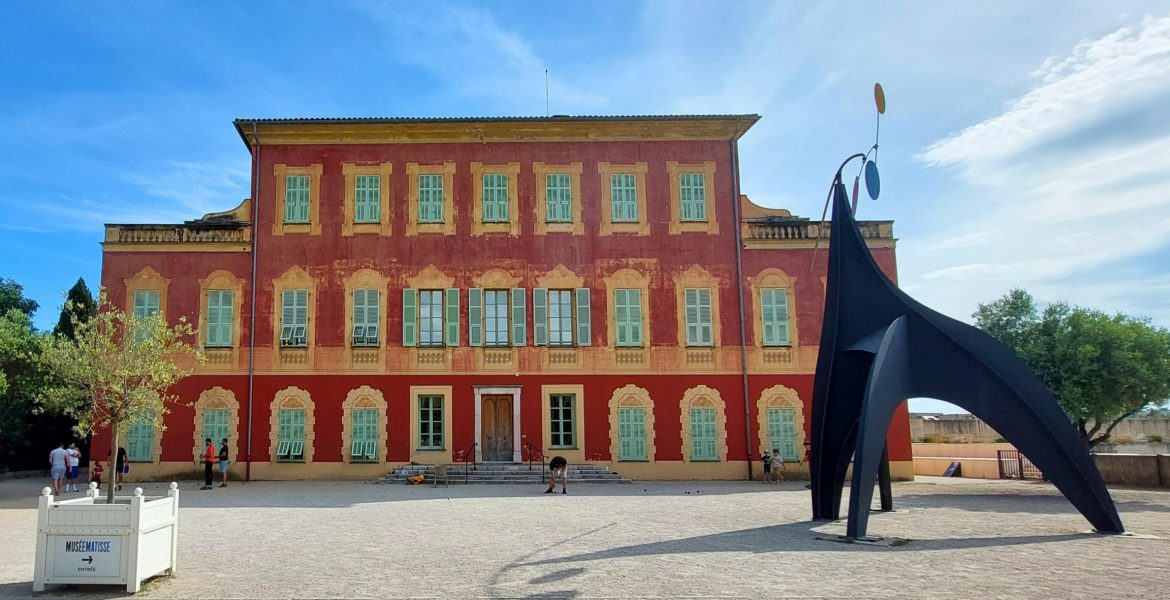
Musée Matisse
The Musée Matisse is located in the leafy Cimiez district, and getting there already feels a bit like stepping into another world. As soon as you leave the center of Nice behind, the atmosphere changes. The plane tree–lined streets grow wider, and the air feels noticeably clearer.
The museum itself is full of surprises. At first glance, it looks like a typical old red mansion, but once you step inside, you discover the modern extension that was added beneath the house to create more space for exhibitions. Inside, you encounter the artist step by step: his early sketches, his search for form and line, and his passion for color, which later made him world-famous. Especially moving are the works he created during illness, when he could no longer paint and began to develop his famous cut-outs. Reduced, yet full of life.
When you come here, take your time. Afterwards, sit in the small park behind the museum and let your gaze wander through the trees. It is exactly what Matisse loved: to simply look, to be still, to feel color.
Theme: The life and work of Henri Matisse
Location: Cimiez Hill, next to the Roman ruins
Visit duration: 45–60 minutes
Tip: Perfect to combine with a walk to the Cimiez Monastery and its peaceful garden, beautifully serene, free to visit, and offering wonderful views
Opening hours: Daily 10:00 a.m. to 5:00 p.m., closed on Tuesdays
Website: Official website of the museum
Musée Marc Chagall
There are museums that impress, and there are museums that move you. The Marc Chagall National Museum belongs firmly to the latter. From the moment you step inside, a sense of calm takes over. There is no rush, no crowds, just light, color, and a quiet, almost meditative atmosphere. Chagall wanted people to feel his art rather than study it, and here that idea works beautifully.
At the heart of the museum hang Chagall’s famous Biblical paintings, vast worlds of color that feel both still and powerful. You can’t help but stop in front of them, letting your gaze drift across the deep blues and warm reds, realizing that these paintings do not simply tell stories—they are stories, of longing, hope, love, and memory. Chagall once said, “Color is everything. When color is right, form is right.” Here, you understand exactly what he meant.
One of the most beautiful spaces in the museum is the small concert hall with its glass windows designed by Chagall himself. When sunlight filters through, the room feels like a place outside of time. Sit quietly for a moment, and it is easy to forget that life continues beyond those walls.
If you prefer to explore the museum with guidance, you have two lovely options. The museum itself regularly offers guided tours in English (check the links on their website). These are perfect if you want to learn more about the background of the paintings. Alternatively, you can book a private tour through GetYourGuide, an exclusive experience for art lovers who want to delve deeper into the artist’s world (starting at around €220).
Theme: Spiritual and poetic works by Marc Chagall
Location: Cimiez, easily reached on foot or by bus
Visit duration: 60–90 minutes
Tip: Watch the short film in English shown in the auditorium. It gives a moving glimpse into Chagall’s life and creative journey.
Opening hours: Daily 10:00 a.m.–1:00 p.m. and 2:30 p.m.–5:00 p.m., closed on Tuesday
Website: Official website of the museum
MAMAC (currently closed)
Anyone who thinks Nice is all pastel tones and romance has never been to the MAMAC. The Museum of Modern and Contemporary Art stands right in the heart of the city, between the Old Town and the green Promenade du Paillon, and it is impossible to miss. Angular, geometric, full of glass and concrete, it was designed as a deliberate contrast to the rest of the city. Inside, the same uncompromising energy continues. Pop art meets avant-garde, installations meet bold gestures, and every so often, a spark of rebellion flashes through.
The MAMAC focuses mainly on art from the 1950s onward, including works by the Nouveaux Réalistes around Yves Klein (yes, the one with the famous “International Klein Blue”) and Arman. There are also changing exhibitions that challenge, surprise, and sometimes simply delight. A great example: entire rooms filled with objects that at first seem chaotic but gradually reveal meaning. If you love modern art, you will feel at home here. If you are skeptical, this might be the place to start liking it.
A true insider tip is the rooftop terrace. From up there, you have a stunning view over Nice, with its red rooftops, green parkland, and the shimmering Mediterranean beyond. Even many locals do not know about it.
Please note that the MAMAC has been closed since January 2024 for extensive renovation work. As part of the Promenade du Paillon 2 project, the museum is being completely modernized and redesigned. The reopening is currently planned for 2029.
In the meantime, art in Nice remains very much alive. The MAMAC is hosting temporary exhibitions across the city, in partner galleries and public spaces, keeping the contemporary art scene vibrant throughout the renovation period.
Theme: Pop art, modern and contemporary art
Location: Between the Old Town and the Promenade du Paillon
Visit duration: 60–90 minutes
Tip: Do not miss the rooftop terrace for a fantastic view over Nice
More info: Current updates and exhibition details can be found on the official MAMAC website.
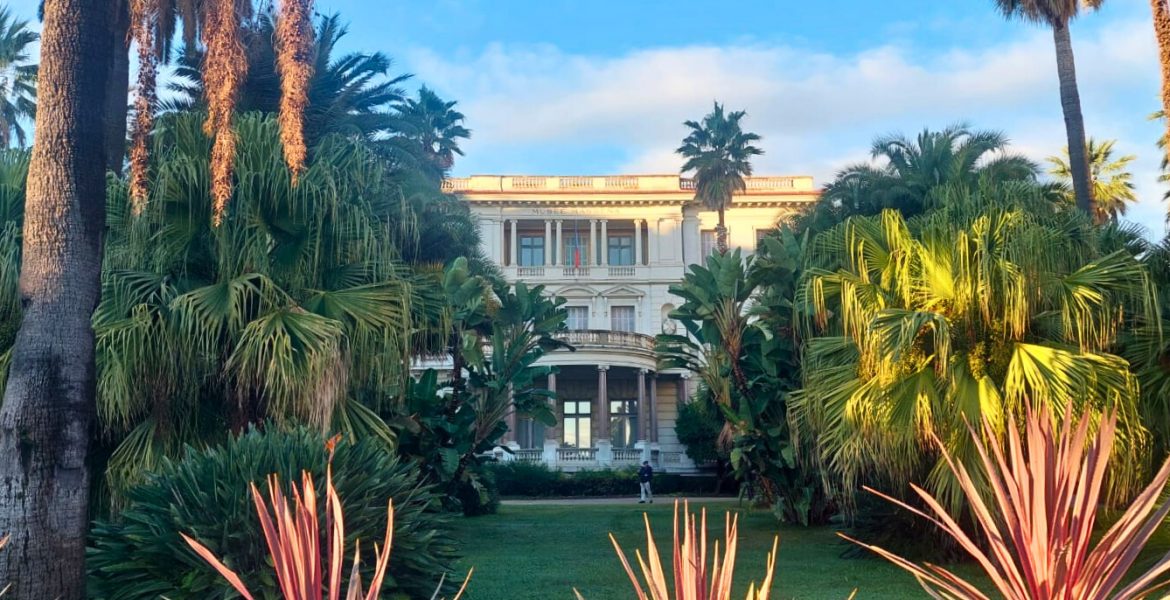
Musée Masséna: The History of the Riviera
Right on the famous Promenade des Anglais stands a villa that looks like it belongs in a French film. White stone, curved balconies, a palm garden with fountains in front, and inside, a journey back to the golden age of the Côte d’Azur: the Musée Masséna.
This museum tells the story of Nice, showing how a quiet fishing village became a gathering place for writers, artists, royalty, and winter visitors from across Europe. The Belle Époque lives on here in vintage posters, historical furnishings, elegant halls, and small stories about luxury, longing, and the enduring myth of the French Riviera.
What I like about the Musée Masséna is its charm and calm presentation. The history of the city is told gracefully, without fuss, and the house itself is a discovery in its own right.
Theme: History of Nice and the Côte d’Azur
Location: Promenade des Anglais
Visit duration: 45–60 minutes
Tip: Perfect to combine with a stroll along the Promenade
Opening hours: Daily 11:00 a.m.–6:00 p.m., closed on Tuesdays
Palais Lascaris: Baroque Splendor in the Old Town
In the narrow streets of Nice’s Old Town stands a palace that is easy to miss while wandering, even though it is one of the city’s most beautiful places: the Palais Lascaris. From the outside it appears rather modest, but as soon as you step inside, a different world unfolds. Built in the 17th century, the palace once belonged to a Genoese noble family. Today it is a small, atmospheric museum filled with stucco ceilings, frescoes, tapestries, and Venetian mirrors that whisper stories of a bygone era.
What makes it special is how approachable it feels despite its elegance. The Palais Lascaris does not seem like a museum but rather like a house that still remembers its former life. The old staircases, cool marble floors, and the light filtering through the windows all seem to murmur fragments of history. One of its greatest surprises is the collection of historical musical instruments. More than 500 are on display, including rare harps, lutes, and violins, a true delight for music lovers.
When you stroll through Nice’s Old Town, take the time to step inside. The Palais Lascaris is the perfect place to pause for a while, calm, mysterious, and wonderfully photogenic.
Theme: Baroque city palace and historical musical instruments
Location: Old Town (Vieux Nice)
Visit duration: 30–45 minutes
Tip: A great short stop between the Old Town alleys and the Cours Saleya
Opening hours: Daily 10:00 a.m.–6:00 p.m., closed on Tuesdays
Musée des Beaux-Arts
The Musée des Beaux-Arts is one of the quieter museums in Nice, which is precisely what gives it its charm. It lies just beyond the city’s bustle, in the Les Baumettes district, housed in an elegant 19th-century villa. The building itself exudes style, with high ceilings, parquet floors, and marble staircases that instantly evoke the refined spirit of the French Riviera.
The collection spans from the 16th to the 20th century and offers a wonderful mix of French, Italian, and Dutch art. Works by Monet, Sisley, and Rodin can be found here. Many rooms feel almost private, and you often find yourself standing alone before the paintings. The Musée des Beaux-Arts is not a place of spectacle but of quiet discoveries.
For those who love culture but prefer to avoid crowds, this is the perfect spot. It is a museum for taking a deep breath, a serene counterpoint to the lively rhythm of central Nice.
Theme: Classical European art
Location: Les Baumettes (west of the city center)
Visit duration: 45–60 minutes
Tip: Best visited in the afternoon when most people are at the beach
Opening hours: Daily 11:00 a.m.–6:00 p.m., closed on Mondays
Website: Official website of the museum
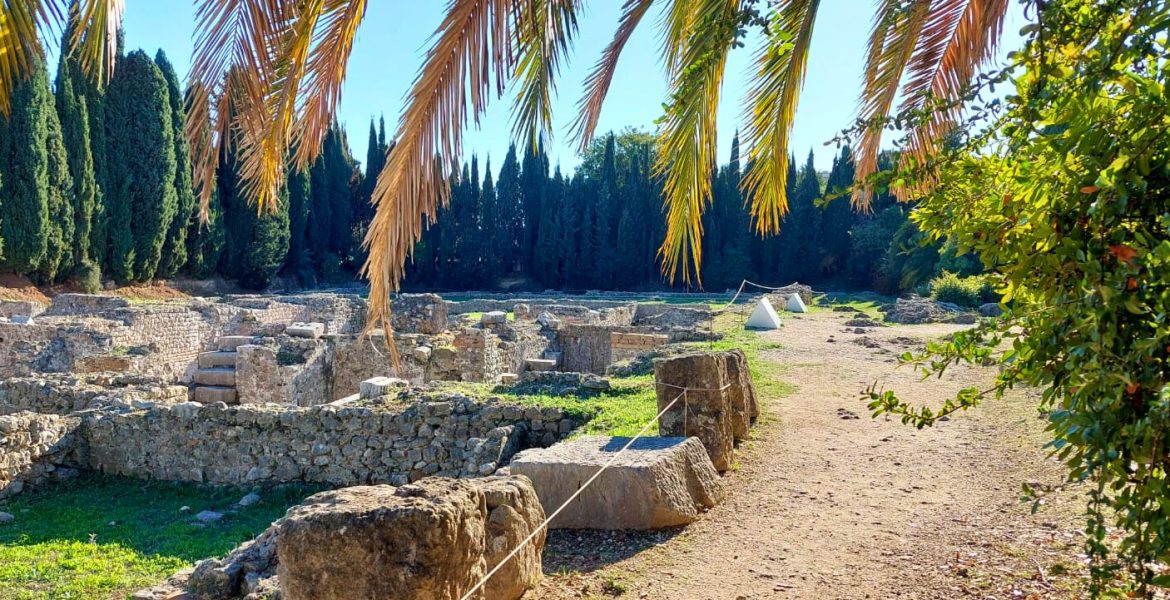
Musée Archéologique de Nice-Cimiez: Tracing the Footsteps of the Romans
Just a few steps from the Musée Matisse lies a place that is surprisingly little known, even though it tells an entire chapter of Nice’s history: the Musée Archéologique de Nice-Cimiez. Here, on a hill overlooking the city, once stood the Roman settlement of Cemenelum, long before Nice was ever called Nice. Walking through the open-air site means stepping across stones that are nearly 2,000 years old: the remains of baths, roads, and an amphitheater that is still used for events today.
The small museum next door displays artifacts from the lives of the Roman inhabitants: mosaics, pottery, jewelry, and tombstones. Much of it feels strikingly personal, bringing history within reach. The place has a calming, almost meditative atmosphere, perhaps because time seems to move more slowly here… or because the lives of the ancient Romans do not feel quite as distant as one might think.
What makes this museum special is the combination of culture and nature. Archaeology in the open air, accompanied by birdsong; at times it feels less like a museum visit and more like a quiet walk through history.
Most of the exhibition signage is in French, but information cards in several languages are available at the entrance for both the museum and the outdoor area.
Theme: Roman history of Nice
Location: Cimiez (next to the Musée Matisse)
Visit duration: 45–75 minutes
Tip: Perfect to combine with the Musée Matisse and the Monastery Gardens, both just a short walk away
Opening hours: Daily 10:00 a.m.–6:00 p.m., closed on Tuesdays
Website: Official website of the museum
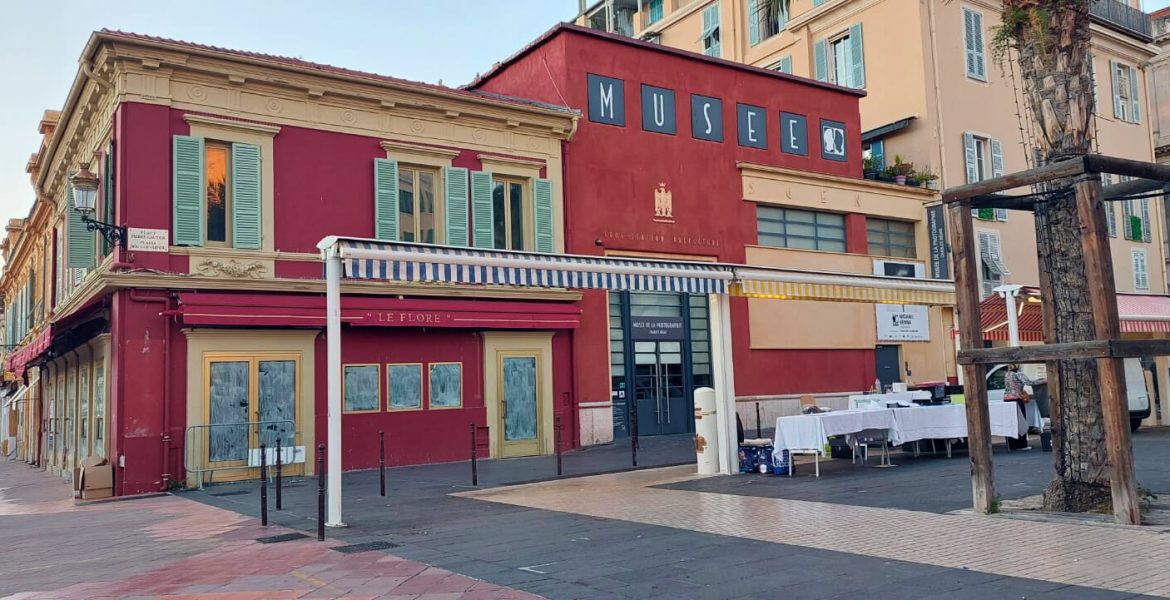
Musée de la Photographie Charles Nègre: Images That Tell Stories
In the heart of the Old Town, right by the Cours Saleya, lies the Musée de la Photographie Charles Nègre, a modern yet pleasantly understated photography museum. It is one of those places you intend to “just pop into for a minute,” only to find yourself staying much longer than planned. The reason is simple: the rotating exhibitions are superbly curated, ranging from contemporary photography to documentary work.
The atmosphere here feels urban and relaxed. One of the best things about it is the chance to discover photographers and themes you do not encounter everywhere. Sometimes the focus is on life in southern France, sometimes on street photography, and sometimes on intimate portraits from around the world. If you love stories told through images, this is your place.
The museum is not large, which makes it perfect for a short cultural stop during a stroll through the Old Town. Afterwards, grab an ice cream just around the corner or sit down for a coffee on the Cours Saleya—it is hard to imagine a better break.
Theme: Contemporary photography and temporary exhibitions
Location: Old Town (near Cours Saleya)
Visit duration: 30–45 minutes
Tip: Ideal for a quick cultural stop while exploring the Old Town
Opening hours: Daily 10:00 a.m.–6:00 p.m., closed on Mondays
Website: Official website of the museum
Musée International d’Art Naïf Anatole Jakovsky
This is one of the most unusual art museums in Nice. The Musée International d’Art Naïf Anatole Jakovsky is entirely dedicated to naïve art, meaning works created outside of formal art academies. What does that mean in practice? Imagination without limits, colors without fear, and paintings that tell stories of life without being complicated.
The museum is housed in a charming 19th-century villa in the Parc Carol de Roumanie, surrounded by palm trees and Mediterranean gardens. Inside, you will find a surprisingly large collection of artists from around the world, from Henri Rousseau to Séraphine Louis. Some works feel childlike, others dreamy or delightfully eccentric, it is a very human kind of museum.
Theme: Naïve art from around the world
Location: West Nice (near Fabron)
Visit duration: 45–60 minutes
Tip: Perfect if you are looking for a museum that lifts your spirits
Opening hours: Daily 10:00 a.m.–12:00 p.m. and 1:30 p.m.–6:00 p.m., closed on Tuesdays
Musée de Préhistoire de Terra Amata: Where It All Began
Long before the Nice we know today, long before Matisse, the Belle Époque, and Riviera glamour, people lived here who hunted by the sea and mastered the use of fire. The Musée de Préhistoire de Terra Amata tells their story. The modest museum building on Mont Boron stands on the very site where archaeologists in the 1960s discovered one of Europe’s most important prehistoric settlements.
Inside, you learn about life 400,000 years ago: stone and bone tools, traces of early shelters, and animal remains from hunting. The museum is small but fascinating, especially because you are standing right where the excavations took place. Even a mild curiosity about early human history is enough to make this visit rewarding.
Theme: Prehistory and the Terra Amata excavation site
Location: At the foot of Mont Boron
Visit duration: 30–45 minutes
Tip: Perfect to combine with a walk to Nice’s harbor or a hike up Mont Boron
Opening hours: Daily 10:00 a.m.–6:00 p.m., closed on Tuesdays
Website: Official website of the museum
Muséum d’Histoire Naturelle de Nice (currently closed)
The Natural History Museum of Nice is the city’s oldest museum. Located just across from the beautiful Promenade du Paillon, it showcases the wildlife and natural heritage of the Provence–Alpes–Côte d’Azur region. Anyone who loves nature or is visiting with children will find it a friendly and relaxed place to explore.
The collection feels almost nostalgic in parts: preserved animals, fossils, shells, and minerals. That is exactly what gives it its charm. It feels like a window into the days before museums went digital and interactive. No gimmicks, just the wonder of the natural world up close—or almost close enough to touch.
Theme: Natural history of the Riviera and Alpine region
Location: City center, near Place Garibaldi and the Promenade du Paillon
Visit duration: 30–45 minutes
Tip: Ideal for rainy days or a quiet cultural stop in between
Opening hours: Currently closed
Practical Tips for Visiting Museums in Nice
Museums belong to Nice just as much as the sea and the mimosas. The best part is that the city makes culture easygoing and accessible. To help you make the most of your museum visits, here are a few practical things to know before you go.
 Many museums are free of charge
Many museums are free of charge
Most museums in Nice offer free admission to several groups of visitors, including those under 18, students, journalists, and people with disabilities (often including one accompanying person). In almost all museums, admission is also free on the first Sunday of each month.
Nine of the eleven museums mentioned here can be visited with the four-day museum pass for a one-time fee of €15 (the Musée Marc Chagall and MAMAC are not included). You can buy it online or at participating museums.
 Tuesday is museum rest day
Tuesday is museum rest day
Most museums in Nice are closed on Tuesdays. Exceptions include the Musée des Beaux-Arts and the Musée de la Photographie, which are closed on Mondays instead. If you are planning a culture day, aim for Wednesday through Sunday.
 Book tickets online for the major museums
Book tickets online for the major museums
For the more popular museums, especially the Marc Chagall Museum and MAMAC, it is worth booking your ticket in advance, particularly during the high season or on rainy days.
 Getting there
Getting there
Nice has an excellent public transport system. You can easily and affordably reach all museums by tram or bus. Especially convenient: the museums in Cimiez are close to each other and can be combined in one day.
Which Museums Suit You Best?
Not sure where to start? Here is a quick guide depending on what inspires you most:
| If you… | Then visit… |
|---|---|
| love art | Musée Matisse, Musée Marc Chagall, MAMAC |
| enjoy history | Musée Masséna, Musée Archéologique |
| seek calm | Musée des Beaux-Arts, Palais Lascaris |
| like photography | Musée de la Photographie |
| want something unusual | Musée d’Art Naïf |
| are on a budget | check out the 4-day museum pass |
| need a rainy-day plan | MAMAC or Chagall – perfect indoors |
| are traveling solo | Matisse, Beaux-Arts, or the Photography Museum – relaxed and peaceful |
Nice’s museums are like small windows into the city’s soul: the emotional Chagall Museum, the playful Musée d’Art Naïf, the Roman ruins of Cimiez, the serene Musée des Beaux-Arts. And in between, that unmistakable Nice feeling: relaxed, open, and just a little poetic.
What I love about Nice is how naturally art belongs here. It is part of everyday life and not confined to the big museums. That is why a day full of culture in Nice never feels heavy or academic, but light and full of inspiration, like a stroll through stories you carry with you afterwards.
If you truly want to understand Nice, visit its museums. They reveal what defines the city beyond clichés and postcard images. You take something with you, even if you cannot quite put it into words.
FAQ – Frequently Asked Questions About Museums in Nice
Are museums in Nice free?
Not generally, but many offer free admission for certain groups: visitors under 18, students, journalists, and people with disabilities (often with one accompanying person). In almost all museums, admission is also free on the first Sunday of each month.
Which museums in Nice are a must?
If you are short on time: Chagall for emotion, Matisse for color and light, MAMAC for modern art, and Masséna for Riviera history.
When are museums in Nice open?
Usually from Wednesday to Monday, with most closed on Tuesdays. Exceptions include the Musée des Beaux-Arts and the Photography Museum, which are closed on Mondays.
How do I get to the museums in Cimiez?
Take the tram or bus toward Cimiez / Arènes. The ideal combination: Matisse + Archaeology Museum + Monastery Gardens.
Are there museum passes in Nice?
Yes, there is the French Riviera Pass, which offers discounts for several museums and attractions. You can also get a 4-day museum pass for €15 that covers all city museums except the Chagall Museum and MAMAC.
